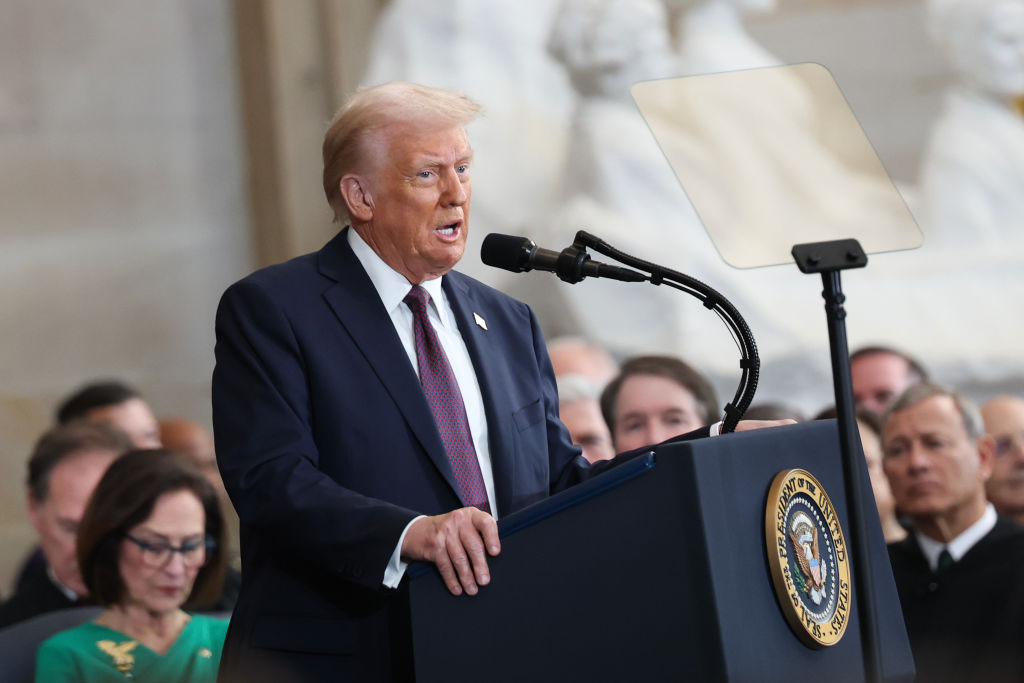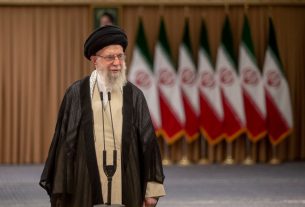In his defiant return to office, President Donald Trump cast himself as a “peacemaker” and cited the release of “the hostages in the Middle East.”
In a benediction following Trump’s second inaugural address, the president of Yeshiva University prayed for the release of the rest of the Israeli hostages held in Gaza and for calm on college campuses.
Trump, inaugurated to his second term as president on Monday in a ceremony freckled with prominent Jewish attendees, focused his address on what he predicted would be “the golden age of America.” Among the domestic policies he outlined were a broad crackdown on undocumented immigrants, a halt to government recognition of transgender identity and the imposition of tariffs. And he boasted of his election victory in November.
But he also took aim at what he called a “catalogue of catastrophic events abroad” under his predecessor, Joe Biden. He did not mention the wars in Ukraine, Israel or Gaza by name but lamented “a government that has given unlimited funding to the defense of foreign borders but refuses to defend American borders.”
He then pledged to reduce American military involvement abroad and end foreign conflicts, a pledge he made repeatedly during the campaign and doubled down on in the weeks before he entered office. (He also pledged to retake control of the Panama Canal, which the United States ceded to Panama decades ago.)
“Our power will stop all wars and bring a new spirit of unity to a world that has been angry, violent and totally unpredictable,” he said.
“We will measure our success not only by the battles we win but also by the wars that we end, and perhaps most importantly, the wars we never get into,” Trump added.
Trump’s advisers were central to the Israel-Hamas ceasefire and hostage release deal that began Sunday, and Trump has since signaled that he is committed to making the ceasefire last. The deal’s initial phase will see a total of 33 Israeli hostages released over six weeks in exchange for hundreds of Palestinian security prisoners. Later stages will see the release of the rest of the hostages and a complete Israeli withdrawal from Gaza.
“My proudest legacy will be that of a peacemaker and unifier, that’s what I want to be,” he continued. “I’m pleased to say that as of yesterday, one day before I assumed office, the hostages in the Middle East are coming back home to their families.” The line drew a standing ovation.
He gave his half-hour address in the U.S. Capitol rotunda in front of a crowd that included some of the most prominent Jewish Americans. Miriam Adelson, the Republican megadonor who was one of his biggest supporters, was in attendance. Also present were Ivanka Trump and Jared Kushner, his Jewish daughter and son-in-law who were heavily involved in his first administration but are expected to stay out of his incoming White House. Tech magnates Mark Zuckerberg and Sam Altman were also in the crowd, as was Jacob Reses, a top aide to Vice President J.D. Vance, and New York Sen. Chuck Schumer, the Democratic leader.
Following Trump’s address was a benediction by Rabbi Ari Berman, the president of Yeshiva University, the flagship Orthodox institution in New York City. Berman began his address with a famous quote in Hebrew from Jeremiah, “Blessed is the one who trusts in God,” and proceeded to speak in greater detail about the Israeli hostages as well as unrest on college campuses.
“Hear the cry of the hostages, both American and Israeli, whose pain our president so acutely feels,” said Berman, who Y.U. said was the first American-Israeli to speak at a presidential inauguration. “We are so thankful for the three young women who just yesterday returned home, and pray that the next four years brings peace to Israel and throughout the Middle East.”
Before mentioning the hostages, Berman also obliquely referenced the pro-Palestinian protests that rocked university campuses last year, praying that God “guide our schools and college campuses, which have been experiencing such unrest, to inspire the next generation to pair progress with purpose, knowledge with wisdom and truth with virtue.”
Berman was one of a range of faith leaders to deliver prayers at the ceremony, though one who had been on the program did not appear. Imam Husham al-Husainy of Dearborn, Michigan, a Muslim-majority city that Trump won in November, was due to speak. But he sparked protest from right-wing activists who objected to his past comments defending the Lebanese terror group Hezbollah — with which Israel just fought a months-long conflict — and he appears to have been excluded from the ceremony.




